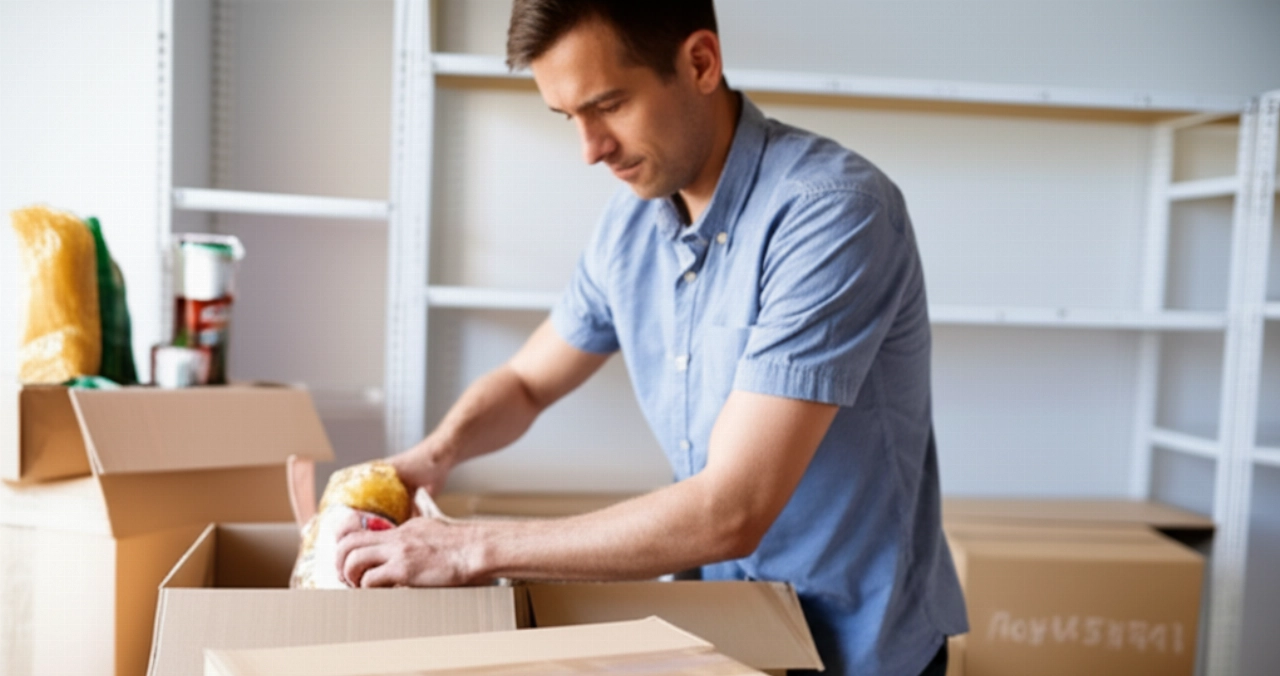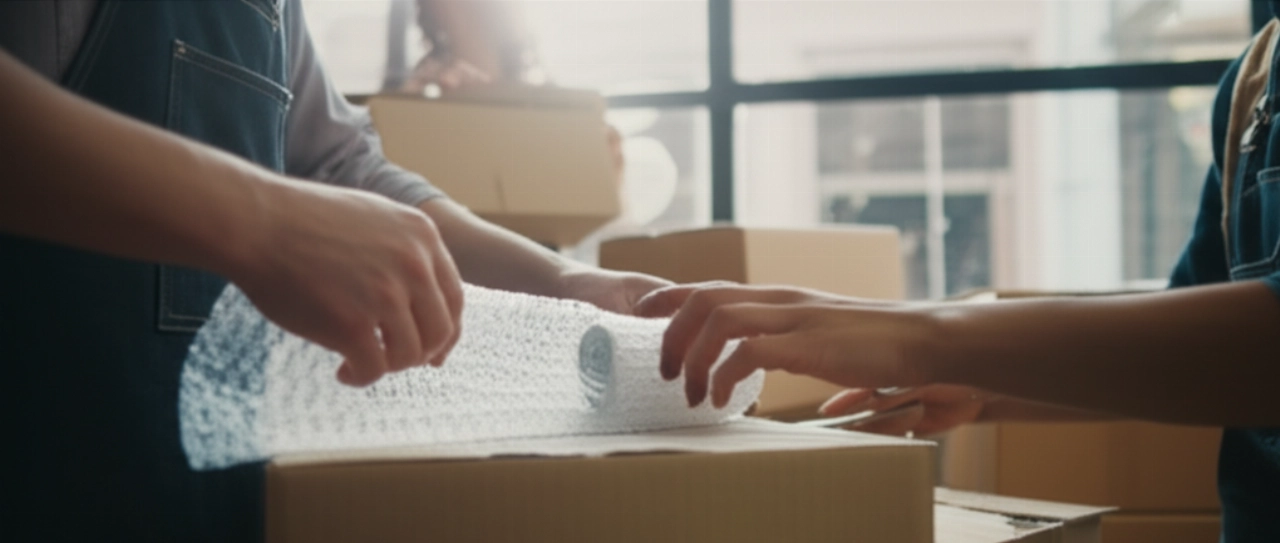Moving is a whirlwind of emotions and decisions. Between boxes to fill, bureaucracy to face, and the nostalgia already setting in, it's easy to feel overwhelmed. That sense of impending chaos, the fear of forgetting something important or damaging what you love, is a burden we know well.
But there's an aspect often underestimated, which can turn into a real nightmare if not handled carefully: your pantry. How to manage food before moving without waste, without health risks, and without adding further stress to your to-do list?
If you're wondering how to tackle this challenge, you're in the right place. This guide isn't just a list of tips, but your map to transform the anxiety related to managing perishable foods and supplies into a concrete, efficient, and peaceful plan. We will guide you step by step, because your peace of mind is our primary goal.

Beyond the Pantry: Why Smart Food Management is the First Step Towards Your New Life
Imagine arriving at your new home, tired but satisfied, and not having to face the added stress of a mountain of food to dispose of, or worse, finding spoiled products. Careful food management before moving is not just a matter of practicality, but a true act of care towards yourself and your future.
It means avoiding financial waste, reducing environmental impact, and, above all, eliminating a source of anxiety that can weigh down your last days in the old house. It's the first step towards a clean, organized, and worry-free new beginning. We at Traslòchi.it know that every detail counts for your peace of mind.

Your Anti-Waste Checklist: Key Steps to Managing Food Before Moving
Tackling the pantry might seem like a daunting task, but with a clear strategy, it will become a simple and rewarding one. Here's our step-by-step guide to impeccably managing food before moving.
Phase 1: Inventory and Strategic Planning
- Assess your supplies: Start at least 3-4 weeks before the move. Open your refrigerator, freezer, and pantry. Make a detailed list of everything you have, checking expiration dates.
- Create a "survival menu": Base your meals for the last few weeks on existing supplies. The goal is to consume as much as possible, minimizing the purchase of new food items. Prioritize simple meals that use ingredients you already have.
- Plan your purchases: Buy only the essentials for the days immediately preceding the move. Avoid large stocks of perishable foods.
Phase 2: Consumption and Smart Disposal
- Prioritize perishables: Focus on fresh fruit, vegetables, dairy products, meat, and fish. If you can't consume them, consider cooking and freezing them (if transport allows) or donating them.
- Gradually empty the freezer: Start consuming the contents of your freezer well in advance. If you have large quantities, organize a "freezer-emptying dinner" with friends or family.
- Donation or disposal: For non-perishable and unopened foods you don't intend to take with you, consider donating them to local food banks or charities. For expired or spoiled food, dispose of it correctly.
Phase 3: Packing and Safe Transport
- Non-perishable foods: Pasta, rice, dried legumes, canned goods, spices, coffee, tea can be moved. Ensure that packages are well-sealed and intact.
- Specific packing: Use sturdy, well-labeled boxes ("Food - Pantry", "Fragile"). For bottles of oil, vinegar, or spirits, wrap them individually and place them in leak-proof containers.
- First-day survival kit: Prepare a small box with essential foods for the first 24 hours in your new home: snacks, coffee, sugar, salt, a couple of disposable plates and cutlery. This will give you some breathing room before unpacking everything.
Phase 4: Special Considerations
- Transporting refrigerated/frozen foods: This is the most delicate part. For short distances, you can use thermal bags with ice or gel packs. For longer distances or complex moves, evaluate whether the cost of special transport justifies the value of the food. Often, it's more cost-effective to consume or dispose of it.
- Plants and pets: They are not food, but often move together. Make sure you have supplies of their food and water for the journey.
- International regulations: If yours is an international move, inquire about customs regulations regarding food imports. Many countries have strict restrictions on fresh produce, meat, dairy, and even seeds. This is an area where Traslòchi.it's experience makes a difference.

Hidden Pitfalls: Common Mistakes and How to Avoid Them in Food Management
DIY without adequate planning can turn food management into a source of unexpected problems. We, as industry specialists, have seen it all. Here are the most common traps and how Traslòchi.it helps you avoid them:
- Unnecessary Waste: Letting large quantities of food expire or having to throw it away at the last minute is a hidden cost and a disappointment. Our planning methodology helps you consume or donate in time.
- Contamination and Pests: Poorly packing food, especially opened items or those with residues, can attract insects or cause spills that damage other belongings. Professional food packing prevents these risks.
- Excessive Box Weight: Liquids and canned goods are heavy. Boxes filled only with food become unmanageable and at risk of breaking. We balance the load and use appropriate containers.
- Customs Issues (International Moves): Attempting to bring prohibited foods across borders can lead to hefty fines, seizures, and delays. Our expertise in international regulations ensures a smooth passage.
Entrusting an experienced partner means transforming these potential pitfalls into details managed with maximum reliability.
From Theory to Practice: How Traslòchi.it Transforms Food Management into a Perfect Detail of Your Move
We at Traslòchi.it understand that moving is a complex orchestra where every instrument must play in harmony. Food management, though seemingly a small detail, is an integral part of the symphony of your peace of mind.
We don't just move boxes; we take care of your life. Our many years of experience allow us to offer you not only a transport service but also comprehensive consulting that includes aspects like managing your food supplies. We will provide personalized advice, help you plan timings, and, if necessary, guide you in the most appropriate choices for disposal or donation.
We are the partner who stands by you, transforming every potential problem into a solution. Our authority stems from a deep understanding of your needs and the ability to anticipate every obstacle, ensuring a smooth and worry-free move, from the first fork to the last box.
Frequently Asked Questions about managing food before moving
- What to do with fresh and perishable food?
- Fresh and highly perishable food (meat, fish, dairy, vegetables) should be consumed or donated before the move. Avoid transporting it, unless you have guaranteed refrigerated transport for short distances.
- Can I move frozen foods?
- For short trips (a few hours), you can use thermal bags with dry ice or gel packs. For longer moves, it is not recommended. The risk of thawing and spoilage is high. It is preferable to consume or donate them.
- What about alcoholic beverages or oil?
- Yes, they can be moved. Ensure that bottles are well-sealed and individually wrapped with bubble wrap or packing paper, then placed in sturdy boxes with dividers or cushioning material to prevent breakage and leaks.
- Are there food restrictions for international moves?
- Absolutely yes. Many countries have very strict customs regulations on food imports, especially fresh produce, meat, dairy, fruit, vegetables, and seeds. It is essential to inquire in advance or rely on specialists like Traslòchi.it who are familiar with these regulations.
- How long before should I start managing food?
- We recommend starting at least 3-4 weeks before the moving date. This will give you enough time to consume supplies, plan meals, and properly dispose of what you cannot or do not want to take.
You've seen how an seemingly minor detail like food management can profoundly influence your moving experience. Transforming potential chaos into an efficient plan is our specialty, because your peace of mind is our ultimate goal.
Perhaps you think it's too much to handle alone, or that such a detail-oriented service is a luxury. But the truth is that preventing problems and waste will save you time, money, and, most importantly, stress. Our guarantee is your peace of mind.
Don't let food be a burden or a source of worry. Your new beginning deserves to be peaceful and smooth. The quote you receive is not just a number, but a detailed plan for your peace of mind, including every aspect, even the smallest.
It's free, no obligation, and takes only a few minutes. Click here, fill in the details, and let our specialists start working for you, transforming every detail of your move into a masterfully managed experience. Start your managing food before moving on the right foot now, with Traslòchi.it by your side.
You might also be interested in:





